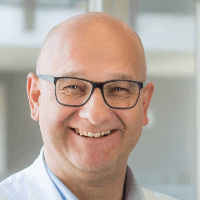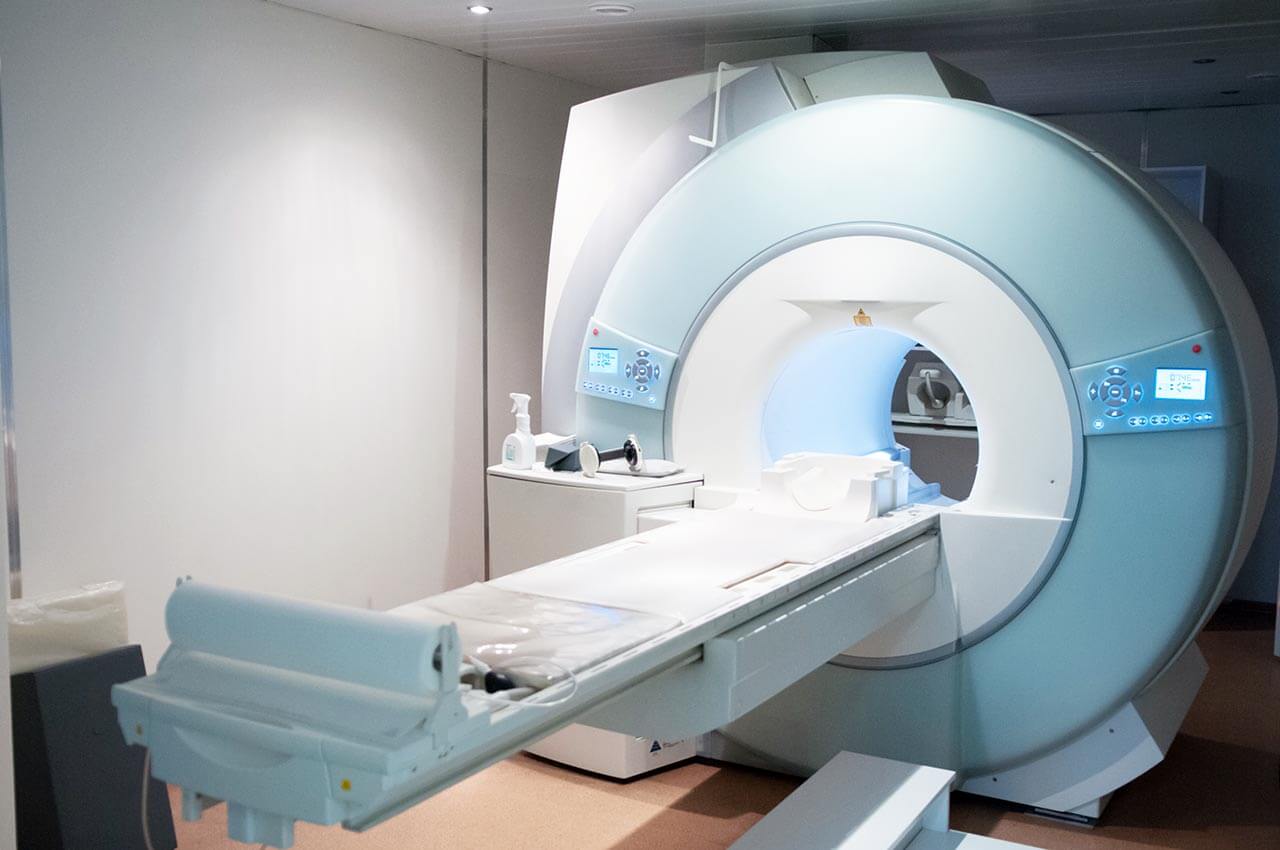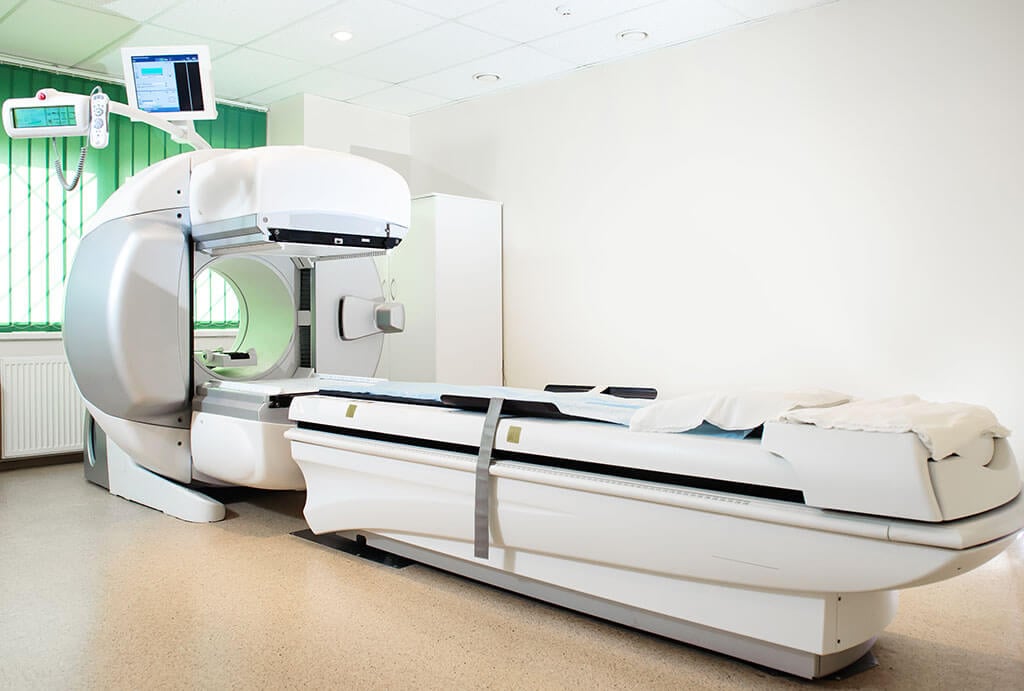
The program includes:
- Initial presentation in the clinic
- history taking
- review of medical records
- general clinical examination
- extensive laboratory examination:
- general blood analysis
- lipid metabolism
- carbohydrate metabolism
- mineral metabolism
- protein electrophoresis
- immune stasus
- X-ray examination
- CT / MRI (if indicated 550/1200 €)
- nursing services
- services of all leading experts
- explanation of individual treatment plan
Required documents
- Medical records
- X-ray examination, MRI/CT scan (if available)
Service
You may also book:
 BookingHealth Price from:
BookingHealth Price from:
About the department
The Department of Pediatric and Adolescent Medicine at the DKD HELIOS Clinic Wiesbaden offers the full range of services for the diagnostics and treatment of various diseases in young patients. The focus is on the children with inflammatory bowel disease, short bowel syndrome, chronic liver diseases, celiac disease, congenital malformations of the kidneys and urinary tract, type 1 diabetes mellitus and other pathologies. The department's specialists have at their disposal state-of-the-art diagnostic equipment for a comprehensive assessment of the health status of children. The medical facility has modern laboratories, an endoscopy unit for both diagnostic and therapeutic procedures, as well as diagnostic rooms with advanced devices for imaging studies, including X-ray, ultrasound and MRI. The doctors working in the department care not only about high-quality medical care, but also about the fact that young patients feel as comfortable as possible during treatment. The specialists also devote enough time to personal communication with parents so that they clearly understand what kind of disease their child is suffering from, and what effective methods are recommended for treatment. The department is headed by Prof. Dr. med. Markus Knuf.
Pediatric gastroenterologists working in the department provide comprehensive diagnostics and treatment of diseases of the digestive tract and liver. Of particular interest is medical care for children with Crohn's disease and ulcerative colitis, short bowel syndrome, celiac disease and chronic liver pathologies, including hepatitis B and C. At the stage of diagnostics, the specialists conduct laboratory, instrumental and endoscopic diagnostic examinations, the results of which allow the attending physician to make an accurate diagnosis and determine the stage of the disease. The treatment regimen is elaborated for each child individually. Whenever possible, the specialists of the department use only conservative treatment, namely drug therapy with innovative drugs. In especially difficult cases, therapeutic endoscopic procedures are performed.
Children often suffer from kidney and urinary tract diseases. The department employs specialized doctors, who using a wide range of diagnostic studies (ultrasound, urodynamic tests, MR urography, etc.), identify disorders in the functioning of the kidneys and urinary system, as well as conduct effective treatment to eliminate them. In addition to taking a complex of medications, biofeedback (BFB) is used in children with impaired bladder function. The BFB technique allows restoring self-regulation of physiological functions of the body and demonstrating high efficiency in the treatment of bladder dysfunction.
Another important focus of the medical facility is the treatment of type 1 diabetes mellitus in children. The classical methods of treating pathology are diet therapy and insulin therapy. The department also provides insulin pump therapy, which makes the child's life much easier. An insulin pump is an electronic device that infuses insulin according to the pre-programmed individual settings. The department conducts training sessions on lifestyle modification in diabetes mellitus for both young patients and their parents. During these training sessions, the patients learn about the features of their disease and methods of its control. The young patients with type 1 diabetes mellitus are also provided with nutritional consultations, since a diet must be followed to compensate for the pathology.
The department's therapeutic offer is complemented by the treatment of allergic diseases, pathologies of the lungs and other organs of the respiratory system, morbid obesity in children. The health of young patients with these ailments is in the safe hands of the specially trained pediatricians who have many years of clinical experience. The specialists conduct a comprehensive examination, after which they prescribe the required therapeutic measures.
The department specializes in the diagnostics and treatment of the following diseases in children:
- Inflammatory bowel disease (Crohn's disease and ulcerative colitis)
- Functional disorders of the gastrointestinal tract (including dysphagia, constipation, encopresis)
- Short bowel syndrome
- Chronic liver disease (including hepatitis B and C, congenital copper metabolism disorders, care for children after liver transplantation)
- Celiac disease
- Morbid obesity
- Congenital malformations of the kidneys and lower urinary tract
- Bladder dysfunction
- Chronic inflammatory joint diseases
- Bronchial asthma
- Atopic dermatitis (neurodermatitis)
- Food allergies and food intolerances
- Type 1 diabetes mellitus
- Other diseases
The department's key clinical focuses include:
- Diagnostics
- Sonography, including functional testing
- Endoscopic examinations of the esophagus, stomach, small and large intestine (gastroscopy, colonoscopy), including tissue sampling for further study (biopsy)
- Percutaneous liver biopsy
- Bladder and joint puncture, lumbar puncture
- Endoscopic airway examinations (laryngoscopy, tracheoscopy, bronchoscopy, diagnostic bronchoalveolar lavage)
- Daily pH metry
- Hydrogen (H2) breath test for lactose, fructose, sorbitol, glucose intolerance to diagnose malabsorption syndrome
- Instrumental diagnostics of the kidneys and urinary tract
- Urodynamic tests to assess bladder function
- Ultrasound examinations and computed tomography of the kidneys
- Scintigraphy
- Magnetic resonance urography
- Instrumental diagnostics of the gastrointestinal tract
- X-ray scanning
- Ultrasound scanning
- Magnetic resonance imaging
- Magnetic resonance cholangiopancreatography
- Diagnostics of the cardiovascular system
- ECG, including stress ECG and daily ECG monitoring
- Echocardiography
- Magnetic resonance imaging
- 24-hour and long-term blood pressure measurement
- Diagnostics of the endocrine organs
- 72-hour and long-term blood glucose measurement
- Functional endocrine testing
- Pulmonary function testing
- Spirometry
- Body plethysmography
- Determination of NO concentration in the exhaled breath
- Allergic tests, including provocation tests
- Treatment
- Drug treatment
- Intravenous antibiotic therapy for cystic fibrosis, pyelonephritis in newborns and early childhood
- Endoscopic therapeutic procedures for gastric and colon polyp removal, dilatation of gastrointestinal stenoses
- Percutaneous endoscopic gastrostomy
- Therapeutic bronchoalveolar lavage
- Biofeedback for the treatment of bladder dysfunction
- Insulin therapy, including insulin pump therapy for diabetes mellitus
- Other medical services
Curriculum vitae
Higher Education and Professional Career
- 1985 - 1992 Study of Human Medicine at the Johannes Gutenberg University of Mainz.
- Since 1992 Assistant Physician in the Department of Pediatric and Adolescent Medicine at the University Hospital Mainz.
- 1993 Doctoral thesis defense.
- Since 1997 Board certification in Pediatric and Adolescent Medicine.
- 1997 Emergency Physician (Neonatology).
- 2001 - 2009 Senior Physician in the Department of Pediatric and Adolescent Medicine at the University Hospital Mainz.
- 2007 Habilitation. Subject: "Assessment of new vaccines in the context of the development of innovative vaccination strategies".
- Since August 2009 Professor in Pediatric Infectology and Pediatric Intensive Care, University Hospital Mainz.
- Since September 2009 Head of the Department of Pediatric and Adolescent Medicine at the DKD HELIOS Clinic Wiesbaden.
Other Activities
- Qualifications in Pediatric Intensive Care, Neonatology and Neuropediatrics.
- "Childhood Infections" Diploma of the German Society for Pediatric Infectious Diseases (DGPI).
- Additional Qualification in Infectology.
- Member of the Society for Clinical Neurophysiology.
- National and international publications, lectures and reports.
- Teaching activities (lectures and seminars for medical students).
- Since 1993 Worked at a Child Care School (Neuropediatrics).
- Since 1997 Worked in a specialized Nursing School, Department of Pediatric Intensive Care (Neuropediatrics, Immunology), as well as Examiner.
- "Good Clinical Practice" Course.
- Member of the ESPED Data Safety Monitoring Board.
Review Activities in Medical Journals
- Klinische Pädiatrie.
- Wiener Klinische Wochenschrift.
- Archives of Diseases in Childhood.
- Scandinavian Journal of Infectious Diseases.
- Drugs of Today.
- Vaccine.
- Swiss Medical Weekly.
- Infection.
Photo of the doctor: (c) DKD Helios Klinik Wiesbaden
About hospital
The DKD HELIOS Clinic Wiesbaden has long made a name for itself in the international medical arena by introducing an optimal model of medical care, combining the use of the most advanced medical technologies, the experience of highly qualified doctors and impeccable quality of patient care. The medical facility first opened its doors to patients in 1970. The world famous Mayo Clinic Rochester in America served as a model for the design of the medical complex. Since the foundation of the clinic, the main direction of its activities has been comprehensive diagnostics of complex diseases integrated into an interdisciplinary treatment concept. Today, an integral part of clinical practice is also preventive diagnostics aimed at the early detection of pathological changes in the human body. In recent years, the clinic has been actively developing the direction of surgery, in which it has significantly succeeded. The clinic enjoys a reputation as one of the best medical facilities in Europe in the field of endocrine and colorectal surgery, as well as in hernia repair surgery.
The clinic has 24 specialized departments. Each of them offers a team of experienced doctors, whose main value is the patient's health. The work of all doctors of the medical facility is based on a single credo – "Treat not a disease, but a patient". According to this belief, the course of treatment should be as individual as possible, taking into account the patient's physical characteristics, lifestyle, diet, emotional state, etc.
The clinic's bed capacity consists of 138 inpatient beds and 60 beds in a day hospital. Many diagnostic and therapeutic procedures are performed on an outpatient basis. The diagnostic and treatment rooms, like the operating rooms of the clinic, are equipped with state-of-the-art technology to ensure the observance of strict hygiene and safety standards. The advanced medical equipment allows detecting the slightest changes in the functioning of organs and their structure with impeccable accuracy, thanks to which doctors can diagnose complex pathologies at the very early stages. This greatly increases the chances of a successful cure.
The location of the clinic in Wiesbaden, known as one of the oldest thermal spas in Europe, is another pleasant advantage for the patients. Arriving at the clinic for a preventive diagnostic examination, one can improve his health in the healing thermal springs, as well as enjoy the sightseeing of historical monuments. The medical center is located in the immediate vicinity of the English style Spa Park founded in the distant 1852, so in the free time from medical procedures one can take a pleasant walk in the beautiful park.
Photo: (с) depositphotos
Accommodation in hospital
Patients rooms
The patients of the DKD HELIOS Clinic Wiesbaden live in comfortable single and double rooms. Each patient room has an ensuite bathroom with shower and toilet. The standard patient room furnishings include an automatically adjustable bed, a bedside table, a table and chairs, a TV and a telephone.
The clinic also offers enhanced comfort rooms with spacious bathrooms, which additionally include a large mirror, hairdryer, changeable towels and toiletries. These patient rooms also have a safe for storing valuables, a free minibar with soft drinks, a flat-screen TV with satellite channels and free Wi-Fi.
Meals and Menus
The patients of the clinic are offered tasty and balanced three meals a day: breakfast, lunch and dinner. If for some reason you do not eat all the foods, you will be offered an individual menu. Please inform the medical staff about your dietary preferences prior to treatment.
The clinic also has a cozy cafe where one can taste delicious snacks, salads, main courses and desserts. One can also enjoy aromatic coffee, delicious tea and soft drinks in the cafe.
Further details
Standard rooms include:
Religion
The religious services are available upon request.
Accompanying person
During the inpatient program, the accompanying person can live with the patient in a patient room or a hotel of his choice. Our managers will help you choose the most suitable option.
Hotel
During the outpatient program, the patient can stay at the hotel of his choice. Our managers will help you choose the most suitable option.




